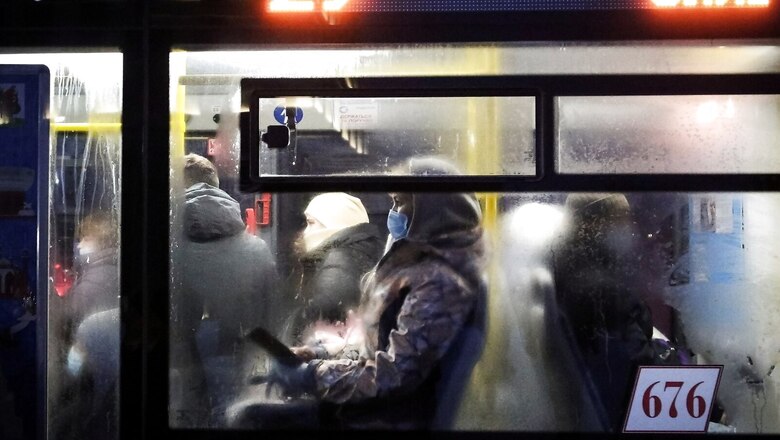
views
The World Health Organisation recently said it was very concerned over the surge of Covid-19 infections and fatality rates in Europe. The warning came as various European countries report record-high infection rates, and implement full or partial lockdowns.
Russia, Austria, Belgium, Netherlands are among the nations witnessing a deluge of cases right before the festival and new year season. With Europe once again the epicentre of the global pandemic that first prompted lockdowns in March 2020, new restrictions and vaccine mandates are expected to spread nearly two years after the first COVID-19 case was identified in China. Here’s a look at how and why the continent has become the coronavirus hotspot:
Germany Struggling
Official figures Monday showed more than 30,000 newly confirmed cases in Germany over the past 24 hours — an increase of about 50% compared to one week ago. The country is this week expected to pass 100,000 coronavirus-related deaths since the start of the pandemic. Hospitals warn that ICU capacities are nearly exhausted, with some patients having to be transferred to clinics in other parts of Germany.
Lockdown in Austria
Austria became on Monday the first country in western Europe to reimpose lockdown since vaccines were rolled out, shutting non-essential shops, bars and cafes as surging caseloads raised the spectre of a second straight winter in deep freeze for the continent. Austria told people to work from home if they can, and shut cafes, restaurants, bars, theatres and non-essential shops for 10 days. People may leave home for a limited number of reasons, such as going to workplaces, buying essentials or taking a walk.
Netherlands Sees Protests Over Lockdown, Cases Still High
The Netherlands reimposed some lockdown measures on its 17.5 million population last weekend for an initial three weeks in an effort to slow a resurgence of the virus, but daily infections have remained at their highest levels since the start of the pandemic. The situation is tense in the country as riots broke out in cities on Sunday, the third night in a row that police clashed with mobs of angry youths who set fires and threw rocks to protest COVID-19 restrictions.
Russia Covid Deaths at All-time High
Russia’s coronavirus death toll was still hovering near all-time highs Monday, but the number of new infections continued to decline. The country which has been struggling with a Covid peak, saw 1,241 COVID-19 deaths, down from the pandemic’s record of 1,254 recorded last week. The task force also reported 35,681 new confirmed cases, reflecting a steady downward trend since early November when the daily numbers topped 41,000, the highest level since the start of the pandemic.
US List of ‘Do Not Travel’ Advisory as List of Nations Facing Outbreak Grows
Denmark, the Czech Republic, Belgium, the UK, France are also facing Covid-19 waves. The US Centers for Disease Control and Prevention (CDC) and the State Department on Monday advised against travel to Germany and Denmark because of a rising number of COVID-19 cases.
The CDC elevated its travel recommendation to “Level Four: Very High” for the two European countries, telling Americans they should avoid travel there, while the State Department issued parallel “Do Not Travel” advisories for both countries.
The CDC currently lists about 75 destinations worldwide at Level Four, with many European countries on the list including Austria, Britain, Belgium, Greece, Norway, Switzerland, Romania, Ireland and the Czech Republic.
Bulgaria Restrictions, EU to Discuss Covid Certificates
Bulgarian authorities have also added 14 European Union and Schengen Area member countries to the red list of countries severely affected by coronavirus in recent weeks. This means that visitors from these areas will now face additional entry restrictions into Bulgaria, according to reports. The restrictions takes effect from today.
As member countries take varying measures to combat the latest wave of the pandemic, the European Union is debating how to update its digital Covid-19 certificates and its approach to travel within and outside the bloc today.
Experts attribute the spread to factors such as the winter season, insufficient vaccine coverage, and the regional dominance of the more transmissible Delta variant.
According to experts, the winter season often brings with an onset of more virulent diseases, attributed to conducive conditions of increased transmission and low temperatures.
The Delta variant, with its increased fatality-rate and transmissibility has been a cause of concern for the world. The virus, since the start of the pandemic, has been evolving to a scary degree and is becoming more lethal than its original form. In such a scenario, experts say that unvaccinated people help more mutations occur.
In Russia, the surge in deaths comes amid low vaccination rates and lax public attitudes in Russia toward taking precautions. About 40% of Russia’s nearly 146 million people have been fully vaccinated, even though the country approved a domestically developed COVID-19 vaccine — Sputnik V — months before most of the world.
In Germany, Health Minister Jens Spahn urged Germans to get vaccinated, including with booster shots if their first round of inoculation occurred more than six months ago. “By the end of this winter pretty much everyone in Germany (…) will have been vaccinated, recovered or died,” Spahn told reporters in Berlin. Some politicians in Germany have suggested the country may need to consider compulsory vaccinations, like its neighbor Austria.
Dr Hans Kluge, regional director of WHO told the BBC that 500,000 more deaths could be recorded by March unless immediate action is taken. According to Dr. Kluge, increasing the use of masks could help right away.
Mandatory vaccination measures, according to Dr. Kluge, should be viewed as a “last resort,” but a “legal and societal debate” about the issue would be “very timely.”
“Before that, there are other means, such as the Covid pass,” he said, adding that this is “not a restriction of liberty, but rather a tool to maintain our individual freedom.”
Country leaders are also trying very hard to increase vaccination coverage and decrease hesitancy while employing lockdown measures.
With inputs from the Associated Press, Reuters.
Read all the Latest News here

















Comments
0 comment